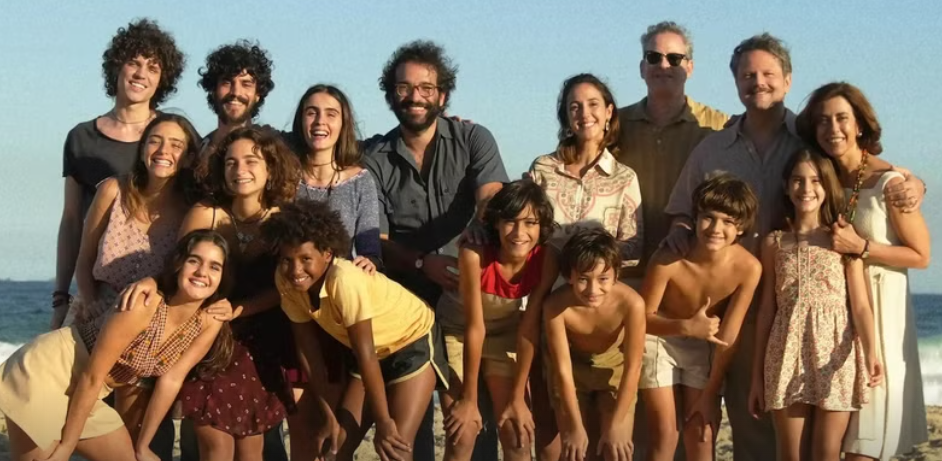I’m Still Here Review: A Family’s Struggle Under Brazil’s Military Dictatorship
In the early 1970s, under the oppressive military rule in Brazil, freedom was scarce, and hope seemed fragile. Amid this turmoil, the Paiva family a vibrant, loving, middle-class household in sun-soaked Rio de Janeiro stood as a beacon of joy and unity. But beneath the laughter and volleyball games on the beach, a darker reality loomed. This family’s story, encapsulated in the film I’m Still Here, directed by Walter Salles, presents a compelling narrative of survival, love, and resilience in the face of a political regime that tore countless families apart.

In this article, we’ll dive into the plot, characters, and emotions of I’m Still Here, which not only brings to life the memoir of Marcelo Rubens Paiva but also serves as a haunting reflection of the many families destroyed by political tyranny. Along the way, we’ll explore the film’s larger themes of hope, family, and the strength of the human spirit amidst relentless adversity.
The Paiva Family’s Joyful Days in Rio
Before the storm of political oppression descended, the Paivas were like any other family living in the paradise of Rio de Janeiro. They shared laughter, meals, and vacations by the sea. The family, led by Rubens Paiva (played by Selton Mello) and his wife Eunice (Fernanda Torres), raised their five children in a seemingly perfect world. This was a family that loved fiercely and lived life to the fullest.
But as anyone who lived through the 1970s in Brazil knows, the country was on the verge of something sinister. Brazil’s military dictatorship ruled with an iron fist, suppressing dissent and labeling anyone who opposed them as enemies of the state. Rubens, a former congressman involved in opposition activities, found himself increasingly under the government’s watchful eye. The Paiva family’s sunny days were numbered.
Walter Salles masterfully sets up the family’s idyllic life in the early part of the movie, portraying their deep bond. The warm scenes are deliberately crafted to evoke a sense of foreboding, as the viewers can’t help but feel that the happiness won’t last.
When the Joy Fades: Brazil’s Military Dictatorship
Brazil’s political climate in the 1970s was marked by fear and paranoia. The military regime, which came to power in 1964, instituted a repressive system that targeted political dissidents, activists, and anyone deemed a threat. Citizens lived in fear of arbitrary arrests, torture, and even disappearances.
For the Paivas, this threat became a harsh reality. Despite Rubens’ political involvement being relatively low-key he helped organize safe houses and liaised with foreign journalists the government labelled him a subversive. In the blink of an eye, the family’s comfortable life was shattered.

The abduction scene in I’m Still Here stands as one of the most chilling moments in the film. Rubens is taken from his home in front of his children, in an almost mundane manner, as soldiers politely ask him to come for questioning. This quiet, understated horror is one of the film’s strengths. The threat is not in loud gunfire or explosions but in the creeping fear that takes hold of the family.
Eunice’s Struggle: A Mother’s Fight for Justice
With Rubens gone, the weight of holding the family together falls on Eunice. Fernanda Torres delivers a powerful performance, embodying a mother who refuses to break under pressure. She fights relentlessly for the return of her husband, navigating the terrifying world of the Brazilian military, where answers are scarce, and the truth is elusive.
Eunice is more than just a wife and mother. She becomes the heart of the story, carrying the emotional weight of the narrative. As she endures interrogations and imprisonment herself, she clings to the hope that her husband will return. Even as the days turn into weeks and months without any word from Rubens, Eunice’s determination doesn’t falter.
This depiction of maternal strength is one of the film’s standout features. I’m Still Here doesn’t just focus on the political struggle but highlights the personal toll such regimes take on families. Eunice’s struggle is a universal story of love, courage, and resilience in the face of unbearable loss.
The Paiva Children: Innocence Lost
The impact of Rubens’ disappearance ripples through the entire Paiva family, especially the children. Each of them experiences the trauma differently. The eldest, Veroca, initially seems carefree, enjoying her teenage years in Rio’s vibrant social scene. But after witnessing the brutality of the regime firsthand, her innocence is shattered.

As the military’s presence grows more oppressive, the younger Paiva children Marcelo, Nalu, Eliana, and Babiu are left in a state of confusion and fear. They try to maintain some semblance of normalcy, but the absence of their father and the uncertainty surrounding his fate cast a long shadow over their childhood.
This emotional strain is evident throughout the film, particularly in scenes where the family gathers for meals or takes a trip to their favourite restaurant. The children continue to play, laugh, and engage with each other, but their joy feels increasingly hollow. I’m Still Here poignantly shows how even the simplest moments like enjoying ice cream together are tinged with sadness when a family member is missing.
The Political Context: Brazil’s Darkest Days
To fully understand the gravity of the Paiva family’s situation, it’s essential to grasp the political landscape of Brazil during this era. The military dictatorship, which lasted from 1964 to 1985, was marked by widespread censorship, repression, and the use of violence against perceived enemies of the state. Thousands of Brazilians were imprisoned, tortured, or “disappeared” during this period.
Rubens Paiva’s real-life story is one of many tragic accounts of individuals who opposed the regime and paid the ultimate price. His disappearance became a symbol of the dictatorship’s brutality, and his family’s quest for justice mirrored the broader struggle for human rights in Brazil.
Director Walter Salles, who grew up during this period, brings a personal touch to the film. His intimate knowledge of the Paiva family allows him to create a deeply moving narrative that captures the fear, uncertainty, and resilience of those living under the regime.
Hope Amidst the Tragedy: A Family’s Enduring Spirit
Despite the overwhelming sense of loss and despair that runs throughout I’m Still Here, the film ultimately leaves viewers with a sense of hope. The Paiva family, though scarred by the events of the 1970s, continues to live, laugh, and find joy where they can.
In the film’s final act, we see the Paivas gathered once again for a family photo. It’s a bittersweet moment that reminds us of the power of love and resilience. Even after enduring unimaginable pain, the Paivas refuse to let their spirits be crushed. Their story serves as a testament to the strength of the human spirit and the unbreakable bonds of family.
A Moving Tribute to Family and Resilience
I’m Still Here is more than just a political drama it’s a celebration of family, love, and the enduring power of hope. Through the story of the Paiva family, Walter Salles shines a light on one of Brazil’s darkest chapters while also showing us that even in the face of overwhelming adversity, the human spirit can prevail.
Whether you’re interested in historical films or deeply emotional family dramas, I’m Still Here offers a powerful narrative that will resonate with audiences long after the credits roll. It reminds us that while governments may try to suppress dissent and control lives, they can never fully extinguish the love and resilience that define families like the Paivas.
Frequently Asked Questions (FAQs)
1. Is I’m Still Here based on a true story?
Yes, I’m Still Here is based on the memoir of Marcelo Rubens Paiva and chronicles the real-life experiences of the Paiva family during Brazil’s military dictatorship.
2. What happened to Rubens Paiva?
Rubens Paiva was abducted by the Brazilian military in 1971 and never returned. His fate remains unclear, though it’s widely believed he was tortured and killed while in custody.
3. What themes does I’m Still Here explore?
The film explores themes of family, love, resilience, political oppression, and the psychological toll of living under a repressive regime.
4. How does the film compare to other political dramas?
While I’m Still Here deals with political repression, its focus is more on the emotional impact of such events on a family, similar to films like Roma. It’s less about the politics and more about the human cost.
5. What message does I’m Still Here leave viewers with?
The film ultimately delivers a message of hope, emphasizing that even in the face of unimaginable tragedy, family and love can help people endure and heal.
This in-depth exploration of I’m Still Here not only sheds light on a critical period in Brazilian history but also serves as a moving tribute to the power of family and resilience in the face of overwhelming adversity.





